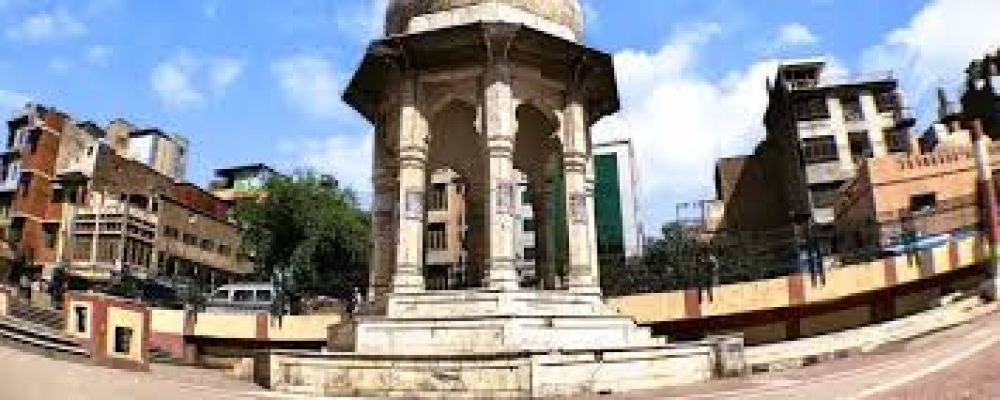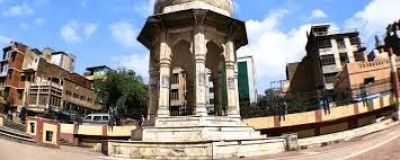

Chowk Yadgar, located in the heart of Peshawar's old city, offers visitors a rich tapestry of history to explore. Originally constructed in memory of Colonel E.C. Hastings by the British in 1892, it has served as an important communal space and has been witness to various pivotal events in the city's history. Embark on a guided historical tour and learn about the iconic moments and architectural shifts the square has seen. From the bustling street life to the diverse architectural styles that reflect different eras, your guide will take you through the evolution of this landmark. You'll hear stories of the independence movement, the significance of the place to the people of Peshawar, and see how urbanization has transformed the area. The tour is an immersion into the cultural and historical narrative of Peshawar, connecting visitors with the spirit of the city as it stands today.
Indulge in the rich and aromatic food culture of Peshawar with a guided food tour around Chowk Yadgar. This experience is a dream come true for food enthusiasts eager to taste traditional Pashtun delicacies. The tour typically begins with a savory breakfast of Charsi Tikka - succulent lamb chops marinated in a secret blend of spices and grilled to perfection. As the day progresses, you can taste a variety of street foods including Chapli Kebab, Namkeen Gosht, and the delightful sweet treat Jalebi. Each stop on the tour provides not just a sampling of extraordinary flavors but also an insight into the culinary traditions and the history of the dishes you are enjoying. You'll learn about the spices and cooking techniques that are unique to the region. The duration is perfect to allow a comfortable pace to savor each dish, as well as take in the ambiance of the old city's streets and bazaars.
The historic Qissa Khwani Bazaar, which is a short walk from Chowk Yadgar, offers an exceptional shopping experience in Peshawar. The 'Bazaar of Storytellers', as it is known, was once a bustling caravanserai along the Silk Route. Today, it is lined with myriad shops that dazzle shoppers with traditional khyber pakhtunkhwa items such as embroidered fabrics, Peshawari chappals (traditional footwear), tribal jewelry, and beautiful handicrafts. A guided shopping spree here is a deep dive into the region's craft heritage. As you meander through the bazaar, vendors may regale you with the tales behind their goods or the history of the market itself. Purchasing items not only provides you with unique souvenirs but also supports the local artisans and preserves the region's artisanal traditions.
The area around Chowk Yadgar is a photographer's paradise. Taking a photography walk through the alleys and markets of Old Peshawar is a journey through a vibrant cultural landscape. From the colorfully adorned rickshaws to the expressive faces of local merchants, every corner offers a dynamic photo opportunity. As you pass by the heritage sites and buzzing bazaars, you will have the chance to capture moments of daily life, ancient architecture, and the interplay of shadows and light in the narrow lanes. Photography enthusiasts will find that the walk offers a blend of portrait, architectural, street, and documentary styles of shooting. Whether you are a beginner or a seasoned photographer, the walk offers an extensive range of subjects to add to your portfolio while appreciating the beauty and stories of the city.
A short distance from Chowk Yadgar is the Sethi House, a well-preserved example of the architectural sophistication of 19th century Peshawar. Stepping into the compound is like time-traveling to an era of magnificence. Cultural evenings at Sethi House are often organized to celebrate the local culture and heritage. Here, you can enjoy traditional music performances, like the rabab and sitar, storytelling sessions, and sometimes, dance performances showcasing local folklore. These cultural nights provide a great way to engage with and understand the essence of Pashtun culture. The elaborate wood carvings, magnificent hujras (guest rooms), and the overall ambience of the Sethi House add to the enchanting experience of a cultural evening. It is a wonderful way to end your day by immersing yourself in the performing arts of the region.
A stone's throw away from Chowk Yadgar, the Sunehri Mosque, also known as the Golden Mosque, stands as a testament to the Mughal influence in the city. Visitors to the mosque are instantly struck by the intricate fresco work and the golden domes from which the mosque derives its name. A visit here offers a peaceful respite from the bustling city life and a chance to delve into the spiritual aspect of Peshawar. The mosque's architecture is a blend of Mughal and Persian styles, with remarkable attention to detail in its design and decorations. The building is not only a place of prayer but also a significant monument that showcases the rich Islamic heritage of the region. Guests can enjoy a guided visit to learn about the mosque's history, significance, and architectural features. The visit can be a deeply moving and educational experience for those interested in history, culture, and spirituality.
Pak Tea House, not far from the precincts of Chowk Yadgar, is an institution in itself and a literary landmark in Peshawar. Literary figures and intellectuals have long frequented this place for its ambiance and inspiration. Having an evening tea here is like taking a step back in time to when discussions on poetry, politics, and philosophy were the norm over a cup of tea. The tea house serves a variety of traditional teas and snacks and offers a casual and thought-provoking environment. While you enjoy the robust flavors of traditional 'kahwah' (green tea) or the creamy 'doodh pati chai' (milk tea), you can engage in conversations with locals, gain insights into present-day Peshawar, or simply soak in the nostalgic atmosphere. It's a revitalizing experience that combines the pleasure of tea with a slice of the city's intellectual traditions.
The Peshawar Museum, known for its substantial collection of Buddhist art from the ancient Gandhara region, frequently holds workshops and exhibitions on various aspects of the local history and art. Attending a workshop here is not only captivating but also educational, providing insights into the rich tapestry of the local cultural heritage. The museum itself is a relic, housed in a colonial-era building, and contains a wide range of artifacts from different epochs including statues, coins, manuscripts, and weapons. If you are lucky, you might participate in a workshop that includes a hands-on experience with traditional crafts, a lecture on Gandharan art or a session on the conservation of historical artifacts. This activity is ideal for history buffs and anyone interested in preserving and learning about the past.
Bala Hisar Fort, an ancient citadel in Peshawar, stands as a symbol of the city's resilience and strategic importance through the ages. Dating back to the fortifications built by the Persian Empire, the fort has been the site of numerous historical events. A visit usually involves a guided tour of the fort that offers panoramic views of Peshawar and the opportunity to walk through its massive gates and along its imposing ramparts. Inside, you can explore the royal quarters, barracks, and halls that have housed various rulers across centuries. Exhibits within the fort showcase its history and the military significance it has held for various empires including the Mughals, Sikhs, and the British. It is an experience that brings visitors in touch with the military and political history of Peshawar and offers a glimpse into how past conflicts have shaped the present city.
Peshawar is home to a long-standing tradition of Sufi music, and attending a Sufi music night near Chowk Yadgar is a soul-stirring experience. These musical gatherings, usually held in a Dargah (Sufi shrine), feature qawwali performances, which are devotional songs that aim to induce a state of spiritual ecstasy. The qawwals, or singers, lead the audience on a journey that transcends the physical realm through powerful vocals, rhythmic clapping, and harmonious instrumentals. Such events are typically frequented by both devotees and those who appreciate the cultural and spiritual depth of Sufi traditions. For visitors, it is a chance to witness the intense passion and unity of a community brought together by the love of music and the divine. The evenings are not just about entertainment but also about experiencing the shared human connection that music can evoke.
